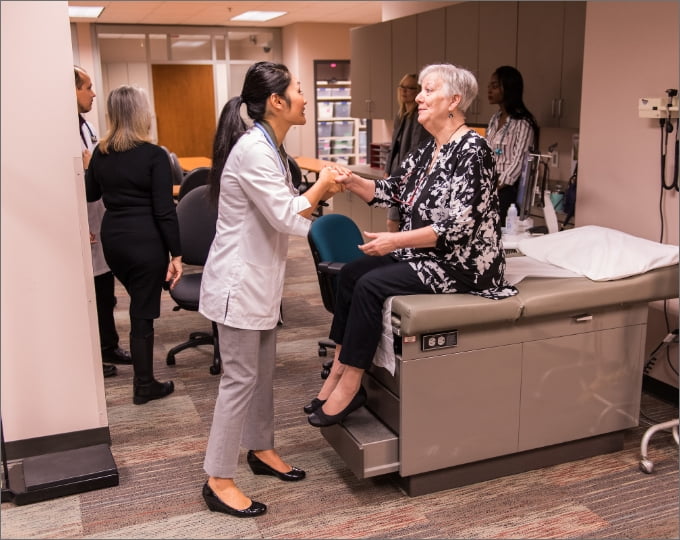
Four Ways Family Nurse Practitioners Promote Quality Patient Care
December 19, 2019Nurse practitioner quality of care is increasingly recognized as an important development in the medical field. Trained with a holistic approach to health, family nurse practitioners (FNPs) care for the whole person and support the entire patient experience.
Since the role of nurse practitioner was developed more than 50 years ago, a growing collection of research supports the level of quality demonstrated across the profession. As a result, the medical community is taking note of patient satisfaction in a range of settings and with diverse health scenarios.
Family nurse practitioners are proving to be leaders in advancing positive patient outcomes. Here are four ways that FNPs promote quality in health care.

1. FNPs Emphasize Health and Wellness
Rather than treating just a lone symptom (e.g. headache), FNPs are proactive in helping patients develop healthier lifestyles to promote long-term health (e.g. find ways to cope with stress). FNPs often coach patients on making informed decisions to prevent illness and foster general wellness.
Research by the Centers for Disease Control and Prevention (CDC) demonstrates how FNPs are promoting patient well-being. In a study of more than 136,000 adult patients with chronic conditions, nurse practitioners provided health education across all conditions to improve patient outcomes.
More than just treatment specialists, family nurse practitioners are also health educators.
Another study by the National Institutes for Health evaluated the performance of nurse practitioners (NPs) in a hypothetical case of abdominal pain. Nurse practitioners were more likely than other health care providers to ask questions and carefully considered related factors such as the use of aspirin, coffee, cigarettes and alcohol, as well as psychosocial stress.
Through comprehensive assessment, nurse practitioners — especially FNPs—develop a multifaceted understanding of the patient wellness. Physical, mental or emotional factors that may contribute to health are identified and openly discussed. FNPs are especially nuanced with promoting wellness during all stages of development due to their training.

2. Long-Term Care Extends to the Entire Family
Family nurse practitioners are trained to serve patients of all ages, from prenatal to geriatric care. This means that the same provider can follow a patient through developmental and life stages. FNPs often develop long-term relationships with patients, supporting their health into adulthood.
In a long-term relationship, the FNP can develop a deep understanding of the patient's unique health needs. For example, an FNP may monitor a baby through a high-risk pregnancy. This will be foundational to monitoring the child's development through infancy and early life stages.
The same FNP can treat all members of the family. This leads to a broad understanding of the biological factors, social dynamics and lifestyle factors common in the family.
FNPs often care for patients throughout their lives.
An FNP tracking a parent's medical issues will have the context for the health of the spouse and children. For example, physical symptoms induced by anxiety may affect other family members in different ways. Or the FNP caring for a parent will be aware of particular genetic traits affecting a child's health.

FNPs Promote Quality Care for More Patients
FNPs are poised to significantly impact gaps in health care, making quality care available to patients in need. With a projected shortage of primary care providers, family nurse practitioners are increasingly in demand, especially in rural areas.
All FNPs provide services in assessment, diagnosis, planning and evaluation. However, scope of practice does vary depending on the state they live in. States with reduced or restricted practice authority limit at least one element of NP practice and also may require physician supervision. In full-practice states, FNPs operate independently and even are permitted to open their own clinics.
Currently, 22 states and Washington D.C. have granted nurse practitioners full practice authority, allowing FNPs to work without physician oversight, including prescribing medications.
Nurse practitioners have full practice authority in 22 states.
Although the scope of practice varies between states, FNPs are still impactful in their ability to promote quality care. With their focus on holistic care and patient education, FNPs can improve health across the lifespan regardless of the state they reside in.
Additionally, FNPs can treat in a wide range of settings including:
- Private practice
- Urgent care centers
- Community clinics
- Hospital-based clinics and ambulatory settings
- Schools
This flexibility helps make FNPs accessible to patients of all ages and backgrounds. In situations where patients may have limited access to care, FNPs step in to serve as patient advocates.

3. FNPs Are Highly Knowledgeable
Family nurse practitioner quality of care is grounded in extensive medical knowledge. In-depth coursework includes anatomy and physiology, pathophysiology and pharmacology, along with studies in research and treatment methods. With advanced clinical training at the graduate level, FNPs perform exams, order diagnostic tests and provide treatment.
Standardized certification for clinical nurse practitioners assures that comprehensive knowledge levels are achieved for entry-level practice. The American Academy of Nurse Practitioners (AANP) Certification Board or the American Nurses Credentialing Center (ANCC) both evaluate FNP candidates for competency. Evaluation areas on the exams include assessment, diagnosis, planning and evaluation across the patient lifespan.
Trained to serve all age-ranges, FNPs must be knowledgeable on many components including:
- Disease prevention
- Physiology
- Diagnostic procedures
- Medicinal and alternative therapies
FNPs also are required to demonstrate knowledge in crisis management, clinical decision-making and patient counseling.

What Do FNPs Learn About Treatment?
Professional certification goes well beyond surface knowledge. During the AANP exam, for example, nurse practitioners are tested on four areas to assure high-level care.
Here is a brief overview of the expertise required in a practice role:
Assessment:
- FNPs are expertly trained in gathering information. Through academic study and practical experience, they have learned to ask questions and seek out information. By performing examinations and ordering relevant lab tests, FNPs apply knowledge that leads to accurate diagnosis.
Diagnosis:
- FNPs analyze and incorporate the results of the assessment to determine a diagnosis. They are qualified to diagnose many common medical conditions as a family physician would.
Planning:
- In response to a diagnosis, FNPs counsel patients and provide a plan of treatment. Treatment may include pharmacological and non-pharmacological components. The practitioner may offer treatment directly or coordinate care with another specialist.
Evaluation:
- The FNP will follow a patient through treatment and monitor progress, making adjustments as needed.
Nurse practitioners are tested on four areas during the AANP exam to assure high-level care.
What Kind of Procedures Can FNPs Perform?
Although their scope of practice varies by state, family nurse practitioners are knowledgeable about a wide range of medical tests and treatment options. They are also trained to the fullest extent of professional ability, regardless of state practice authority.
FNPs can assess and diagnose countless medical issues without additional referrals to specialists. They are qualified to conduct skin biopsies and interpret ECGs and X-rays.
When implementing treatment, FNPs are also trained in many basic procedures such as minor lesion removal, wound closure and therapeutic injections.

4. FNPs Coordinate Many Aspects of Patient Care
Family nurse practitioner quality of care is multifaceted and centered around the patient. FNPs coordinate many aspects of care during each stage of delivery including:
- Understanding the patient's concerns during assessment
- Evaluating all possible contributing factors to health conditions
- Providing patient education during the discussion of treatment
- Connecting the patient to a network of services and professional support to improve follow-through of treatment
In addition to direct patient-care, FNPs are also equipped to exercise leadership. FNP coursework often includes discussion of nursing theory and quality improvement. Students practice problem identification and strategy development to affect change.
By considering the various components of health care delivery, FNPs can bring synergy to treatment with an emphasis on holistic, patient-centered care.
How Does Coordination Affect Quality of Care?
An FNP's holistic view is especially beneficial in managing chronic medical conditions, such as diabetes. Diabetes is a long-term condition with complex needs; it affects heart function, eye health and the body's ability to fight infection.
An FNP treating a diabetic patient can help prevent complications through proper diet. If the patient experiences a traumatic event like a stroke or heart attack, the FNP can help assure all aspects of care are considered and the patient is supported.
A review by the National Institutes of Health demonstrates the value of advanced practice nurses in emergency and critical care. Results show that NP involvement improves the length of stay, time to consultation, treatment, mortality and patient satisfaction.
FNPs can provide continuity of care and serve as a consistent point of contact for multidisciplinary teams. This high level of coordination helps improves overall care.

Quality of Care is Based on Relationships
NPs— especially FNPs— are often recognized for providing excellent communication to their patients and high quality of care. In fact, the AANP states that over 50 years of research consistently shows not only excellent outcomes, but high patient satisfaction.
Other studies have revealed nurse practitioners are setting new standards in the delivery of health care across the board.
Specific FNP strengths are:
- Amount of time spent with patients
- Careful documentation
- Thorough follow-up
- Depth of information discussed
- Attention to preventative care
- Listening and support
With a holistic approach, FNPs are able to provide care that is “safe, effective, patient-centered, timely, efficient, equitable and evidenced based.”

Take the Next Step as an FNP
Family nurse practitioner quality of care is needed to continue advancing health outcomes for patients. For BSN-prepared nurses, becoming an FNP offers many benefits including more work-life balance, higher pay and greater ability to promote quality patient care.
As a leading FNP institution in Texas and nationwide, Texas Woman's University's online MS- Family Nurse Practitioner program integrates concepts of health promotion. Across the program, students are prepared to master holistic assessment, diagnostic resources and emerge as leaders in health care.
Learn more about Texas Woman's online MS- FNP program.
Sources:
Avorn, J., Everitt, D.E. & Baker, M.W. (1991). The neglected medical history and therapeutic choices for abdominal pain. A nationwide study of 799 physicians and nurses. Accessed November 25, 2019 from: https://www.ncbi.nlm.nih.gov/pubmed/2012450.
“Family Nurse Practitioner (FNP).” American Academy of Nurse Practitioners. Accessed November 25, 2019 from: https://www.aanpcert.org/certs/fnp.
“Quality of Nurse Practitioner Practice.” American Association of Nurse Practitioners. Accessed November 25, 2019 from: https://www.aanp.org/advocacy/advocacy-resource/position-statements/quality-of-nurse-practitioner-practice.
Ritsema TS, Bingenheimer JB, Scholting P, Cawley JF. Differences in the Delivery of Health Education to Patients With Chronic Disease by Provider Type, 2005–2009. Centers for Disease Control and Prevention. Accessed November 23, 2019 from: https://www.cdc.gov/pcd/issues/2014/13_0175.htm.
Woo, Brigitte Fong Yeong, Lee, Jasmine Xin Yu, and Tam, Wilson Wai San. “The impact of the advanced practice nursing role on quality of care, clinical outcomes, patient satisfaction, and cost in the emergency and critical care settings: a systematic review.” Accessed November 25, 2019 from: https://www.ncbi.nlm.nih.gov/pmc/articles/PMC5594520/.

